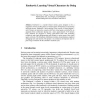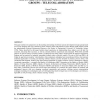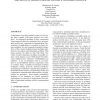188 search results - page 24 / 38 » Back to the Complexity of Universal Programs |
ICSM
1999
IEEE
13 years 11 months ago
1999
IEEE
The FermaT transformation system, based on research carried out over the last twelve years at Durham University and Software Migrations Ltd., is an industrial-strength formal tran...
ICIDS
2010
Springer
13 years 4 months ago
2010
Springer
Emohawk is a narrative-based serious game designed to be a supportive tool for teaching basics of virtual agents development at universities and high-schools. Emohawk is built util...
IADIS
2004
13 years 8 months ago
2004
This paper outlines new perspectives on the teaching and learning of software systems development in large groups based on a newly designed, final year, Software Systems Analysis ...
WSC
1997
13 years 8 months ago
1997
Components of modern parallel systems are becoming quite complex with many features and variations. An integrated modeling of these components (interconnection network, messaging ...
ESOP
2004
Springer
14 years 24 days ago
2004
Springer
t) Peter W. O’Hearn Queen Mary, University of London In the 1960s Dijkstra suggested that, in order to limit the complexity of potential process interactions, concurrent programs...



